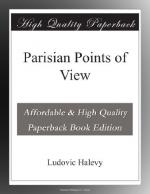And it was he who had declared—ah!—decidedly pleasure got the better of fear. Still trembling with emotion, Mme. Derline went and placed herself before a long looking-glass, an old cheval-glass from Jacob’s, which never till now had reflected other than good middle-class women married to good lawyers. In that glass she looked at herself, examined herself, studied herself, long, curiously, and eagerly. Of course she knew she was pretty, but oh, the power of print! She found herself absolutely delightful. She was no longer Mme. Derline—she was the most beautiful woman in Paris! Her feet, her little feet—their bareness no longer troubled her—left the ground. She raised herself gently towards the heavens, towards the clouds, and felt herself become a goddess.
But suddenly an anxiety seized her. “Edward! What would Edward say?” Edward was her husband. There had been but one man’s surname in her life—her husband’s. The lawyer was well loved! And almost at the same moment when she was asking herself what Edward would say, Edward abruptly opened the door.
He was a little out of breath. He had run up-stairs two at a time. He was peacefully rummaging among old papers in his study on the ground-floor when one of his brother-lawyers, with forced congratulations, however, had made him read the famous article. He had soon got rid of his brother-lawyer, and he had come, much irritated, to his room. At first there was simply a torrent of words.
“Why do these journalists meddle? It’s an outrage! Your name—look, there is your name in this paper!”
“Yes, I know, I’ve seen—”
“Ah, you know, you have seen—and you think it quite natural!”
“But, dear—”
“What times do we live in? It’s your fault, too.”
“My fault!”
“Yes, your fault!”
“And how?”
“Your dress last night was too low, much too low. Besides, your mother told you so—”
“Oh, mamma—”
“You needn’t say ‘Oh, mamma!’ Your mother was right. There, read: ’And whose shoulders—ah, what shoulders!’ And it is of your shoulders they are speaking. And that prince who dares to award you a prize for beauty!”
The good man had plebeian, Gothical ideas—the ideas of a lawyer of old times, of a lawyer of the Rue Dragon; the lawyers of the Boulevard Malesherbes are no longer like that.
Mme. Derline very gently, very quietly, brought the rebel back to reason. Of course there was charm and eloquence in her speech, but how much more charm and eloquence in the tenderness of her glance and smile.
Why this great rage and despair? He was accused of being the husband of the most beautiful woman in Paris. Was that such a horrible thing, such a terrible misfortune? And who was the brother-lawyer, the good brother-lawyer, who had taken pleasure in coming to show him the hateful article?




